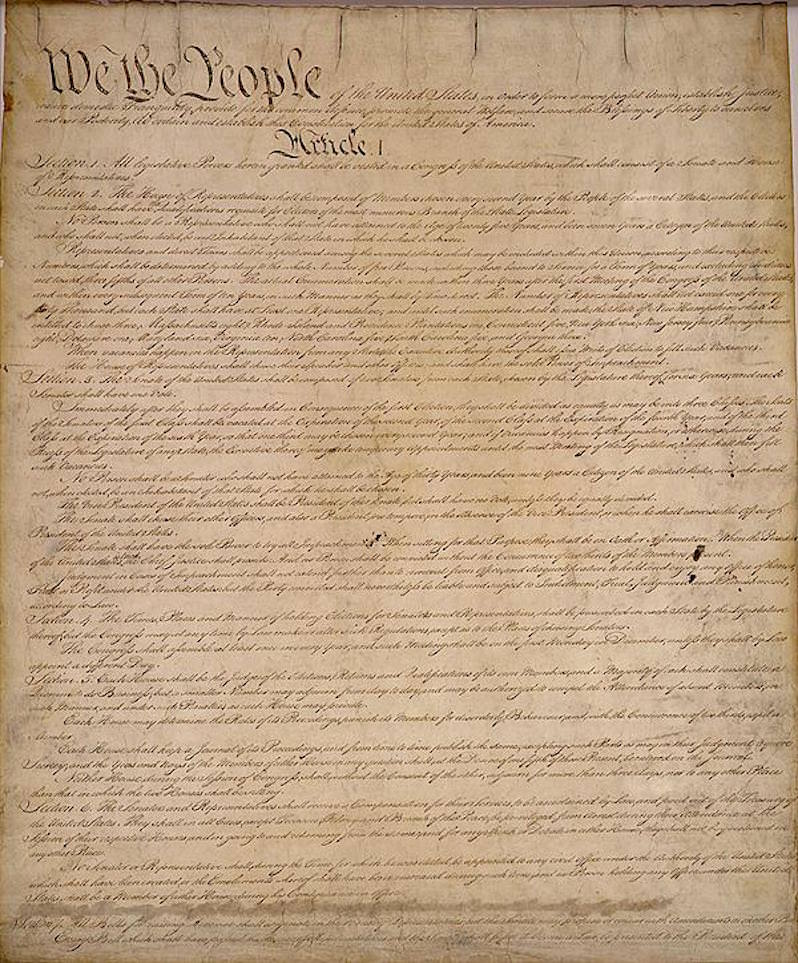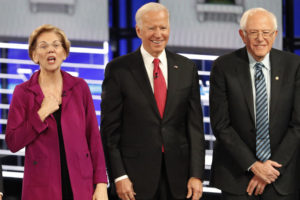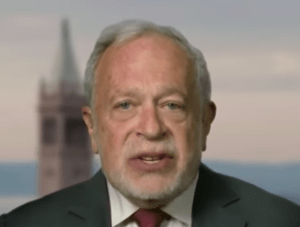The Disempowered Majority
For the next two—and probably four—years, Americans will be governed by Republican politicians largely elected by a minority of voters. These circumstances call for compromise, but that is unlikely to happen.
The preamble of the Constitution. (Wikimedia)
Starting next month, the United States will have a minority government.
This assertion flies in the face of just about everything you have read, since the Republicans will control the White House, the Senate and the House of Representatives. But the American system of representation, invented 229 years ago for 13 states that hugged the Atlantic shore, is more than ever out of tune with how the country’s citizens have distributed themselves, across now 50 states and between metropolitan areas and the countryside.
For the next two and probably four years, a majority of Americans will be governed by politicians largely elected by a minority of us. With the country already sharply divided, this is a problem that can no longer be politely ignored. Worse still, a government put in place by the peculiar workings of an outdated system is threatening to pursue quite radical policies destined to arouse considerable resistance from the disempowered majority.
The first problem is the Electoral College. On only three occasions from the first presidential election in 1788 through 1996 did the loser of the popular vote become president. Two were unusual contests: 1824, when four candidates split the electoral votes; and 1876, when the returns from three Southern states were disputed, a special “Electoral Commission” was formed, and a deal was arranged to make Rutherford B. Hayes president. Benjamin Harrison’s election in 1888 was a more standard affair; his popular vote deficit to incumbent Grover Cleveland was modest, 89,293 votes (0.8 percent).
But the pace of anti-democratic outcomes is picking up. Since 2000, the loser of the popular vote has “won” two elections. George W. Bush became president in 2001 after losing the popular vote to Al Gore by 543,895. And this year came what ought to be — but, alas, won’t be — the result that should concentrate everyone’s attention on the dysfunction of our electoral rules. Hillary Clinton leads in the popular vote count by 2.7 million (2 percent), and her advantage is likely to grow. But Donald Trump is becoming our president.
The inherent illogic of our practices, and the fact that they have nothing to do with the Founders’ intentions, is underscored by this contradiction: We are supposed to ignore the national popular vote, but deeply respect Trump’s narrow 77,000 popular-vote advantage in the three states that will tip the Electoral College his way.
The Constitution itself, of course, makes no mention of popular votes because the framers never expected there to be any. They saw the Electoral College as a deliberative body chosen by state legislatures. So what we are doing now is neither fair nor in keeping with the Founders’ vision.
Compounding the minority government problem is the United States Senate, where each state has two members. California, with a population of 39,144,818, has the same representation as Wyoming, with a population of 586,107 — a ratio of 67-to-1. At the first census in 1790, the population ratio between the smallest and largest state was only 13-to-1.
The underrepresentation of the big states has measurable partisan effect: The 48 members of the Senate Democratic caucus will be representing 55.33 percent of the nation’s population. Once again: The rules disadvantage a majority. Only the GOP’s House majority is backed by a plurality of popular votes.
The representation problems in both the Senate and the Electoral College will only get worse as more Americans move to large metropolitan areas where economic opportunities are concentrated, widening the small state/large state, rural/metro gap.
Yet there is little prospect of change. Article Five of the Constitution makes it virtually impossible to alter representation in the Senate, since any one state can object to being “deprived of its equal Suffrage.” Collectively, small states could also block reforms to the Electoral College. The National Popular Vote initiative to create a compact of states that would throw their electors to the popular-vote winner is an excellent idea but won’t take hold anytime soon.
Since the system currently benefits Republicans and hurts Democrats, any talk about its injustices will be dismissed as partisan pleading by those that benefit from it. But their casual indifference to the non-majoritarian sources of their power will only deepen the resentments among Americans already alarmed by Trump’s attacks against groups that oppose him. They are well aware that they’re being ruled by a minority. These circumstances call for compromise, consensus, statesmanship and outreach to those who have been left out in the cold. I fear that we will be seeing none of this.
Independent journalism is under threat and overshadowed by heavily funded mainstream media.
You can help level the playing field. Become a member.
Your tax-deductible contribution keeps us digging beneath the headlines to give you thought-provoking, investigative reporting and analysis that unearths what's really happening- without compromise.
Give today to support our courageous, independent journalists.









You need to be a supporter to comment.
There are currently no responses to this article.
Be the first to respond.